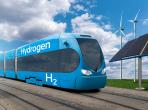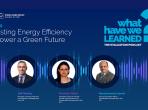
What does the evidence say on enabling private capital for climate action?
New insights on how governments can best address barriers to the flow of private capital for climate action.

🎧 Boosting Energy Efficiency to Power a Green Future
Boosting energy efficiency is critical for addressing climate change. The energy sector is estimated to account for more than two-thirds of total greenhouse gas emissions globally and improving energy efficiency…

Untapped potential for decarbonization: Scaling up energy efficiency
Using less energy to do the same work is the single action with the biggest potential gain on decreasing the amount of carbon dioxide we put into the atmosphere. A new report assesses World Bank Group support for energy…

World Bank Group Support to Demand-Side Energy Efficiency
This report assesses the effectiveness and coherence of the World Bank Group’s support to clients on Demand Side Energy Efficiency (DSEE) and the opportunities to scale them up.
Evaluation of World Bank Group Support to Creating an Enabling Environment for Private Sector Participation in Climate Action, Fiscal Years 2013–22 (Approach Paper)
The objective of the evaluation is to derive lessons from Bank Group experience in improving the enabling environment for private sector participation in climate action. The evaluation will assess the relevance and…
Ecuador Country Program Evaluation (Approach Paper)
The Country Program Evaluation (CPE) for Ecuador seeks to assess the performance of the World Bank Group in helping Ecuador address its main development challenges. The objective of this CPE is to assess how the Bank…

🎧 Lessons Unwrapped from Tackling Plastic Waste
Every year, the world generates 2 billion tons of trash, including 400 million tons of plastic. Most of this waste is mismanaged, piling up and flowing into our oceans, adding to greenhouse gas emissions and land…

The case for energy efficiency in low-income countries: Evidence from Malawi
More than half of sub-Saharan Africa struggles with energy access. An ongoing IEG evaluation of a World Bank project in Malawi indicates that energy-efficiency projects could potentially help meet the high demand for…
World Bank Group Support to Energy Efficiency: An Independent Evaluation of Demand-side Approaches (Approach Paper)
Energy efficiency contributes, first and foremost, to addressing climate change, but it also to addressing three other critical development challenges: firm productivity, energy security, and household energy…

Building a path for the clean energy transition: Lessons from World Bank support for renewable energy
The ongoing dominance of fossil fuels in global energy production accounts for more than 60% of overall greenhouse gas emissions. The Clean Energy Transition —the pathway for decarbonizing global energy— is essential…

